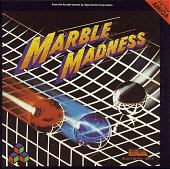Reviews// Mercury Meltdown Remix (PS2)
Allow gravity to exert its inexorable influence
Many SPOnG readers will fondly remember that eight (and sixteen)-bit classic Marble Madness. If you do, could we respectfully ask you to leave, because we're trying hard to appeal to that all-important 15-30 year-old demographic that gets advertisers all tumescent. For those of you who don't remember Marble Madness, it was a game full of all sorts of madness, and quite possibly some marbles. To be honest, we're far too young and cool and trendy to recall.
So, for the entire generation of young trendy cool people who like to spend lots of its high disposable income on consumable goods and services, but does not remember Marble Madness: the first thing you need to know is how seasoned games genius Archer MacLean ruthlessly plundered the basic principle for his game Mercury.
Mercury Madness appeared first on the PSP in 2005 as Archer MacLean's Mercury and, while it was interesting and original (if you overlook the fact that the basic principle was clearly purloined from Marble Madness) it was also so difficult that it made our eyeballs explode.
As a result, although Archer MacLeans Mercury Marbellousness was much anticipated, it failed to set the world alight in quite the way you might expect molten metal spilling all over the place might.
This may be because Mercury Madness is named for Mercury (chemical symbol Hg), and Mercury is the only metal that is liquid at standard temperature and pressure - fact fans.
A year later, Ignition Entertainment decided that a slightly tuned-up version, tweaked to make it easier so that more people could play - might sell in greater numbers... this time, it didn't feature Archer's name of the box - no one likes being associated with a stinker. But Mercury Madness Meltdown was not a stinker, and at the time of writing was enjoying its fifth week in the UK PSP top-30.
So, now for the first time Mercury Meltdown Madness is coming to PS2, so that you can enjoy the same pleasures you've had on the back of a bus on the comfort of your own couch, and afterwards, you can play a game of Mercury.
The Meltdown bit of the game's name confused me a little, since Mercury is already liquid at room temperature. But I concluded that it's probably meant to indicate that things have gotten so excited (a word scientologists use to describe when molecules of a substance vibrate more rapidly) with all the fun and frivolity of the game that they have caused the latent heat of fusion to be reached.
This caused SPOnG’s (young, trendy, and cool) Mr Logic-heads to literally explode - because the latent heat of fusion of Mercury is 234.16 degrees Kelvin, or -39 degrees Celsius, which is below room temperature, at least in polite households.
Those of you who recall Marble Madness (and who are lingering here despite my polite request that you exit), may know this intemperate temperature better as -39 degrees centigrade, or (a god forbid) even -38.2 Fahrenheit. Americans may considerer it so as well, but not because of their age, but because of their country's determined efforts to remain out of step with the rest of every other civilised country, and the scientific world, and long may that remain the case.
And Now For The Review
The basic principle that underlies both Mercury and Marble Madness is the same one that also underlies the main game of Super Monkey Ball that no one plays, preferring instead as everyone does to endlessly play the many and varied primate-in-a-sphere themed sub-games.
In Monkey-Mercury-Madness you must guide a thing around a level by tilting the level, to allow gravity to exert its inexorable influence. By using manual dexterity, the player guides his thing round the level to a goal. Typically said level will have aspects of a maze-type affair about it, with fiendishly located obstacles littered hither and thither to make getting from A (the start) to B (the end) something of a challenge. You get the idea. It couldn't be simpler. The idea, that is, couldn't be simpler - the actual games themselves couldn't be more fiendish and frustrating, and addictive and playable.
Now so far, you may have gotten the impression that we think Mercury Music Prize Madness is somewhat derivative of Monkeyball Meltdown - but you'd be wrong. That is merely an editorial device we have used.
So, for the entire generation of young trendy cool people who like to spend lots of its high disposable income on consumable goods and services, but does not remember Marble Madness: the first thing you need to know is how seasoned games genius Archer MacLean ruthlessly plundered the basic principle for his game Mercury.
Mercury Madness appeared first on the PSP in 2005 as Archer MacLean's Mercury and, while it was interesting and original (if you overlook the fact that the basic principle was clearly purloined from Marble Madness) it was also so difficult that it made our eyeballs explode.
As a result, although Archer MacLeans Mercury Marbellousness was much anticipated, it failed to set the world alight in quite the way you might expect molten metal spilling all over the place might.
This may be because Mercury Madness is named for Mercury (chemical symbol Hg), and Mercury is the only metal that is liquid at standard temperature and pressure - fact fans.
A year later, Ignition Entertainment decided that a slightly tuned-up version, tweaked to make it easier so that more people could play - might sell in greater numbers... this time, it didn't feature Archer's name of the box - no one likes being associated with a stinker. But Mercury Madness Meltdown was not a stinker, and at the time of writing was enjoying its fifth week in the UK PSP top-30.
So, now for the first time Mercury Meltdown Madness is coming to PS2, so that you can enjoy the same pleasures you've had on the back of a bus on the comfort of your own couch, and afterwards, you can play a game of Mercury.
The Meltdown bit of the game's name confused me a little, since Mercury is already liquid at room temperature. But I concluded that it's probably meant to indicate that things have gotten so excited (a word scientologists use to describe when molecules of a substance vibrate more rapidly) with all the fun and frivolity of the game that they have caused the latent heat of fusion to be reached.
This caused SPOnG’s (young, trendy, and cool) Mr Logic-heads to literally explode - because the latent heat of fusion of Mercury is 234.16 degrees Kelvin, or -39 degrees Celsius, which is below room temperature, at least in polite households.
Those of you who recall Marble Madness (and who are lingering here despite my polite request that you exit), may know this intemperate temperature better as -39 degrees centigrade, or (a god forbid) even -38.2 Fahrenheit. Americans may considerer it so as well, but not because of their age, but because of their country's determined efforts to remain out of step with the rest of every other civilised country, and the scientific world, and long may that remain the case.
And Now For The Review
The basic principle that underlies both Mercury and Marble Madness is the same one that also underlies the main game of Super Monkey Ball that no one plays, preferring instead as everyone does to endlessly play the many and varied primate-in-a-sphere themed sub-games.
In Monkey-Mercury-Madness you must guide a thing around a level by tilting the level, to allow gravity to exert its inexorable influence. By using manual dexterity, the player guides his thing round the level to a goal. Typically said level will have aspects of a maze-type affair about it, with fiendishly located obstacles littered hither and thither to make getting from A (the start) to B (the end) something of a challenge. You get the idea. It couldn't be simpler. The idea, that is, couldn't be simpler - the actual games themselves couldn't be more fiendish and frustrating, and addictive and playable.
Now so far, you may have gotten the impression that we think Mercury Music Prize Madness is somewhat derivative of Monkeyball Meltdown - but you'd be wrong. That is merely an editorial device we have used.








